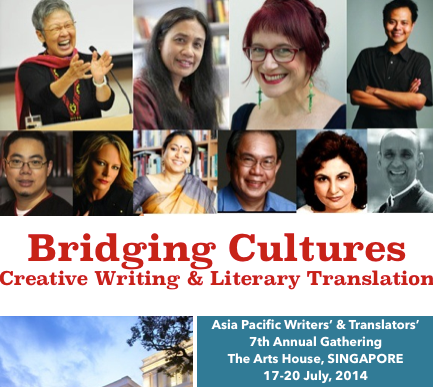Last
Thursday, over 100 participants met at the Arts House in Singapore for the Asia Pacific Writers and Translators (AP Writers) 2014 conference, four days of discussion
with the theme Bridging Cultures: creative writing and literary translation. Vanessa Deza Hangad reports.
The
idea of links across differences prevailed. There were representatives from
Singapore and all over Asia, including India, Pakistan, mainland China, Hong
Kong, the Philippines, Indonesia, Malaysia, and Thailand. Australia, New
Zealand, the US, Canada, Italy and the UK were represented as well. Then there
were the global citizens. The hyphenated Asians - Filipino-Australian, Asian-American,
Singaporean-Canadian - who lined up for cordials and cakes along with a
prominent American translator who had been living in Indonesia for over thirty
years and an Australian travel writer based in Thailand. Clearly, the
participants themselves were the living embodiment of bridges, people for whom nationality and identity are not always fixed points but figurative places to be
traversed by the written word.
Topics
discussed were similarly diverse, and encouraged a vigorous exchange of ideas.
Among
Thursday’s roundtable topics were What is
Literature, Gender Politics: forcing
the issues, and Poetry: art and soul
of it. Regional-specific discussions
included Indonesian Literature Today
and Conversations on Writing Today from
Pakistan.
On
Friday, the roundtable discussions included Changes
to the Literary Landscapes and New Publishing Opportunities, How Translation Transforms both the Text and
Translator, and The Teaching of
Creative Writing in English and the Influence of the Mother Tongue.
On
Saturday, roundtables included Language
and Politics: new dynamics, and Writing
for Children.
Published
authors led the workshops, which were informative and constructive. Freelance
writer Damyanti Ghosh, a veteran of many conferences, said she thought AP
Writers’ workshops were high-quality and worth the money, adding: “They have a concrete
focus. The workshop leaders have a precise brief of what they are supposed to
do.” She particularly liked Tim Tomlinson’s Links,
Fragments and Continuity and Sally Breen’s Editing Your Manuscript. For myself, I found both the writing
exercises from Tim Tomlinson, and also Dr Tony Burch’s Creative Writing Fiction relevant and on-point.
At
least 15 book were launched, with readings interspersed through all four
days. Launches included those for Agnes
S. L. Lam’s Becoming Poets: the Asian
English experience, Linda Jaivin’s new novel, The Empress Lover, set in Beijing, and Kulpreet Yadav’s novel Catching the Departed.
At 2 performance events Singapore OutLoud #1 / #2,
emerging writers shared the spotlight with more established ones. Contributing
authors S. Mickey Lim, Sarah Salmon and I read from Rojak: stories from the Singapore Writers’ Group. The spirit of
reaching out to developing writers was echoed in the Annual General Meeting
held on Saturday, where representatives from Australian literary magazine Griffith Review called for submissions
for the upcoming issue Twenty Under Forty
In the Asian Century.
It was
a packed agenda. Rousing keynotes were given
by Singaporean author Suchen Christine Lim, Filipino-Australian writer Merlinda
Bobis, and Australian writer and translator Linda Jaivin. There was an evening literary
walk with Singaporean writer Rosemary Lim, and a fundraiser of music and the
spoken word organised by Marc Nair, poet and artistic director of Lit Up
Singapore. With so much going on, some attendees felt they were in danger of
missing key events!
As
well as Suchen Christine Lim and Marc Nair Singaporean writers were represented
by poet Joshua Ip, who moderated one of the Singapore OutLoud events, and Lydia Kwa, who launched a re-published
edition by Ethos Books of her novel Pulse.
Many emerging writers based in Singapore also attended. Nevertheless, there was
a desire for even more local representation and participation. Dipika
Mukherjee, whose novel Thunder Demons
was long-listed for the Man Asian Literary Prize, felt that this was a young
festival with its heart in the right place, but expressed concern that “not
more Singaporeans are involved.” She wanted to see a separate panel that
featured Singaporean writers.
Whilst
the conference was taking place, Singapore was rocked by controversy because the
National Library Board decided to remove and destroy some children’s books depicting
alternative families. Suchen Christine Lim addressed this in her opening
keynote. She was like a high priestess with her arms extended, invoking
inclusion with: “May you be loved. May you be treasured. May you be visible for
the children of Singapore who do not come from traditional families - the one
man, one woman and their children model.” Suchen made the powerful point that the model being upheld marginalises all families that don’t fit the
definition, such as single-parent and other alternative households. Her words
brought light and warmth into the cavernous room of what used to be Singapore’s parliamentary debating chamber. When we all stood up with her, we were in
effect building that bridge to celebrate diversity.
I
spoke with Nury Vittachi, Chairman of the AP Writers, as he was looking for
volunteers to read poetry, dance, and sing for Sunday’s closing ceremony. He said:
“Governments are realising that the creative industries are the least polluting
and least resource using industries in the world. So gatherings of creative
people are signs of progress.”

